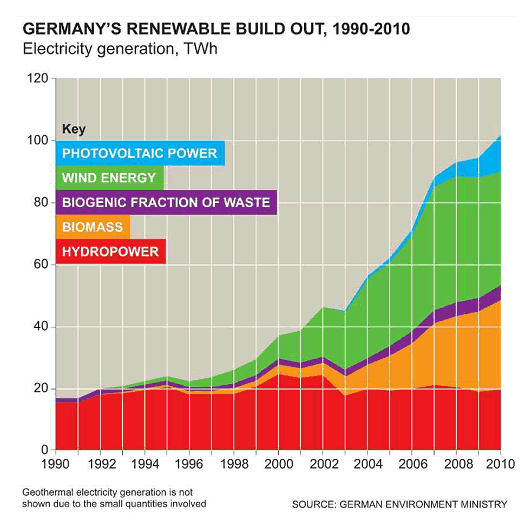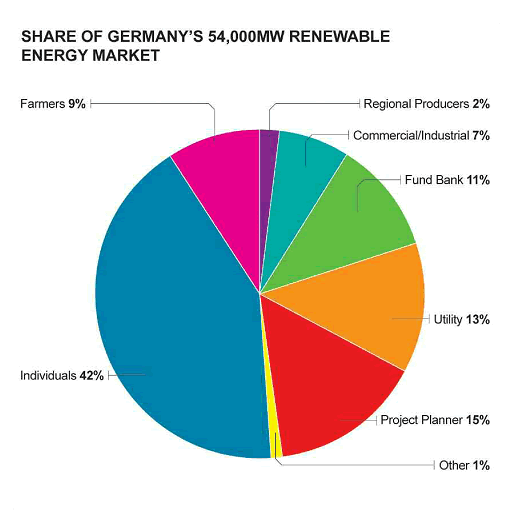With my work for DEAC (Dorset Energy Advice Centre) I have come across this very interesting extract from The Power Book, published by the Local Government Information Unit in September 2012, that I wanted to make available to Dorset Energized users…
Allies in Energiewende by Alan Simpson
WHILE Britain’s ‘radical’ energy thinking gets no further than ‘community buying schemes’, wrapped around the old ‘rigged’ market, Germany has been changing the nature of the market itself.
German towns, cities and regions (of different sizes and persuasions) are now seeking to bring electricity distribution grids into social ownership. This runs from small districts right up to the current initiative in Berlin, where the City is seeking to buy its power distribution network back from the utility, Vattenfall. What the Germans have understood (and we have not) is that transforming the energy market has far more to do with power – democratic power – than with electricity.
A different energy future
The Germans have opened the door on a different way of thinking about energy futures and energy security. In promoting a more open, competitive energy market, successive German governments have also become less afraid to take on the vested interests of their big power companies.
This profound change in energy thinking is at the core of all the practical changes in German energy policy. Break the umbilical link between the power station and the light switch in your home, and it becomes easier to explore the different elements that will make up tomorrow’s energy systems; selling demand reduction rather than increased consumption, using smart technologies that deliver more but use less, and extending community ownership of energy generation and distribution networks.
Empowering the people
Since 1990, German citizens have had a legal right to be producers and suppliers of electricity to their grid system. Two-way meters are a given, not an experiment. German households expect to know how much energy they produce as well as how much they consume. While Britain still plods through a tortuous debate about ‘trials’ of two way meters, the Germans have been using them to transform energy politics. The right to generate became the power to transform. It also provided the platform for constructing a more open, democratic and sustainable energy market.
Germany’s big step-change came in the early 2000s, when the government introduced a system of preferential Feed-in-Tariffs (FITs). These tariffs paid people more for the ‘clean’ energy they produced than the cost of energy they consumed from the grid. In all cases, FITs payment rates decline over time. Ultimately, each technology must ‘wash its own face’ economically; becoming market competitive or being displaced by something that is.
On anyone’s terms, Germany’s renewable energy programme has been astonishing.
The graph above only paints a partial picture. It does not show how, in less than a decade, Germany’s FITs programme has:
- delivered over 400,000 new jobs
- transformed an energy sector, that once had only four major suppliers, into one with over two million contributors
- brought in over €30 billion of private investment a year
- delivered lower German power prices than they had five years ago, and
- operated without public subsidy.
Started under the Social Democratic Party/Green administration and continued by Angela Merkel’s Christian Democrats, this is not a bad decade’s work, even by German standards. But the most telling statistics are in the ownership pattern of the renewable energy investment.
Over 50% of Germany’s renewable energy generation is owned by households, communities and farmers. Energy utilities own less than 13% of the new generating capacity.
The energy war zone
Energy transformation is still a war zone, even in Germany, and not mainly because of climate sceptics. As in the UK, old power empires refuse to die easily. A fierce battle is being waged by ‘old energy’ to sabotage today’s transformations. Britain may have led the last two energy revolutions – from wood to coal, and from coal to oil – but the same vested interests keep us locked at the margins of the current energy revolution. In Germany, energy companies tried to block policy changes by dragging the government through the European courts; saying that new policies were anti-competitive or market distorting. The energy companies lost. In the UK, ‘old energy’ opted (more successfully) for the colonisation of Whitehall. The outcome can be seen in the shambles of the Draft Energy Bill. Its framework would leave Britain with an even more closed energy market, saddle customers with ever spiralling energy bills, introduce a new £5 billion a year nuclear subsidy, and ensure that successive governments could not meet current UK climate targets. It is an agenda for ‘dead-end’ Britain.
As the Germans discovered, the way to become a leader in tomorrow’s energy revolution lies as much in the empowerment of citizens as in the shift into particular technologies. Germany simply put the interests of citizens before those of corporations.
Within the last decade Germany has installed over 60GW of renewable energy capacity; the same as the UK’s current daily energy consumption. Last year alone they installed 7GW; more than the UK installed in over a decade. German power prices are lower today than they were five years ago and the country remains a net exporter of electricity. We are a million miles adrift. Britain may be at the bottom of today’s EU’s ‘renewable energy’ league, but this was where Germany started from too. They went from the bottom to the top in less than a decade. All it took was ‘vision’ and ‘leadership’.
Allies in ‘Energiewende’
Germany is still at the beginning of its ‘Energiewende’ programme – their energy transformation plan. By 2020, Germany intends to generate 35% of its power needs from renewables and to reduce energy consumption by 20%.
But the beauty of Energiewende is in its ability to weave the interests of industry, local communities and environmental groups, into a unified consensus for radical change. The result has been massive public involvement in German energy policy, along with a sense of social ownership of the transformation. In no small measure, this has been built on the ability of Feed-in-Tariffs to drive down power prices; something the UK Treasury seems intellectually incapable of grasping.
Breaking the energy cartel
Britain’s energy market reform debate has not managed to escape the dead hand of Treasury insistence that FITs have to be treated as (capped) public expenditure. The Germans refused to accept such nonsense. From the start, German FITs have been treated as independent elements in energy sector accounting. What then made the difference is Germany’s decision to give priority grid access for all renewables. German solar and wind energy are the first power sources fed in to the energy system. It leaves incumbent power providers to alter their energy mix and output to ensure a balance between power demand and supply.
German utilities no longer control energy supply (and energy prices). Renewable energy drives down peak electricity demand and now supplies anything from 30% to 100% of German electricity needs. This has driven the fall in German power prices.
It may have angered ‘big energy’ but this has been seized on by the country’s big industrial/ technology companies. Bosch, Infineon, Siemens, VW, BMW and others, have become the leading edge of the new energy revolution.
Innovation and invention are at the core of the energy efficiency and ‘grid balancing’ mechanisms that tomorrow’s energy systems will revolve around.
Germany has grasped (before most others) that the ‘iPad generation’ will see smart technologies driving huge increases in energy capacity, on the back of huge reductions in power consumption. It will also deliver innovative ways of storing electricity as well as using it. This will define a completely different landscape of energy thinking. The game is being taken away from the power companies, and the power companies hate it.
A different economics
So, how does Britain get into the game? It is hard to find common ground between what passes for an energy debate in the UK and the deliberations that have been taking place elsewhere. What the UK defines as unaffordable, Germany sees as pivotal. What we count as a cost, the German’s recalculate as a gain. Where the Coalition produces ‘reforms’ that would lock Britain into an (increasingly unaffordable) past, Germany presses towards a more sustainable future.
In achieving a 40% carbon reduction target, by 2020, Germany expects to:
- create 500,000 new jobs
- save €22 billion in avoided fossil fuel import costs (rising to €38 billion by 2030)
- boost GDP by €20 billion per year
- make German national debt €180 billion lower (by 2030) than it would have been without their climate protection measures, and
- deliver a surplus of 34 euro cents on every tonne of carbon saved.
It would be easy to conclude that the trouble with ‘those bloody Germans’ is that they are just bloody good. But then, we could be too.
In Germany, it began with a willingness to think beyond yesterday’s energy agenda and yesterday’s energy interests. Energiewende is based on a different understanding of tomorrow’s energy systems, their use and their ownership. This is where Britain must be too.
A step-change is needed in Britain’s energy thinking. Learning some of the lessons from Germany would be helpful. But what we really need is a different vision for a new energy future.
Extracted from The Power Book, published by the Local Government Information Unit, September 2012
Alan Simpson was Labour MP for Nottingham South from 1992 – 2010. After advising Ministers on renewable energy policy, he left Parliament to concentrate on energy and environment policies. He and his family live in an eco-house they converted in the middle of Nottingham. He is a net supplier of electricity to the grid.
For more information contact: alan@alansimpson.org




The UK can definitely learn from Germany when it comes to embracing renewable energy. The problem with the UK is that there are government incentives for those who use renewable energy but they aren’t widely known by the public.